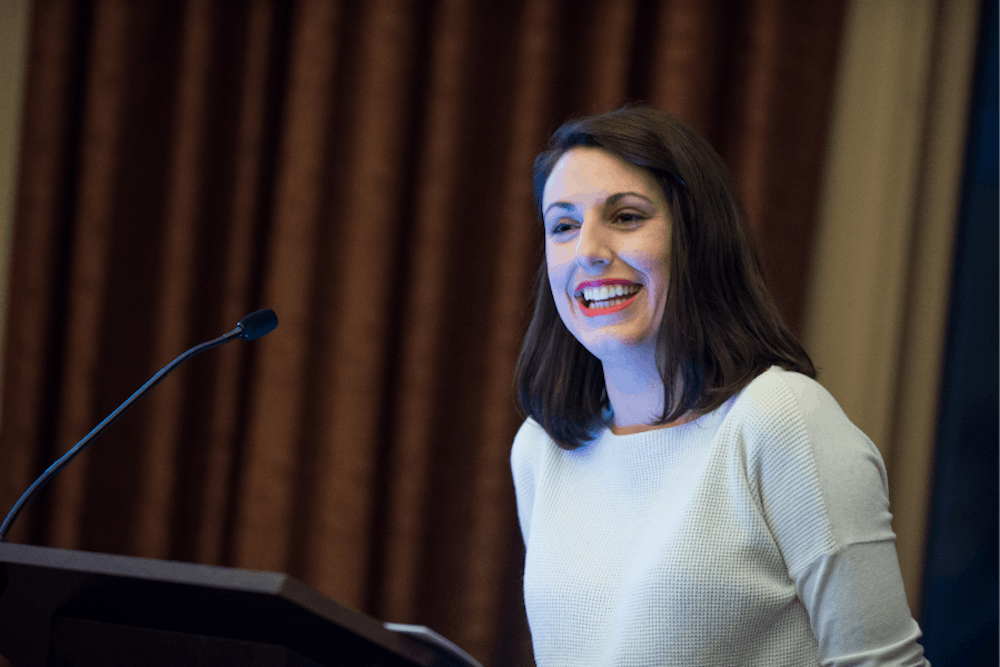Jessica Valenti pictured above, Creative Commons photo
Milam's Musings
In the American lexicon, feminism is often seen as a dirty word because it's used interchangeably with man-hating. Just as insidiously, it's seen as an antiquated idea in 2014 America.
But let's be clear. When 60 percent of rapes go unreported in the last five years and only 3 percent of rapists will see the inside of a jail, according to the Rape, Abuse & Incest National Network, then we should know there is much work to be done in our patriarchal society and that feminism has the answer.
When people, including women, still ask why Janay Palmer would marry and stay with Ray Rice after what he did to her, then we should know there is much work to be done in our patriarchal society and that feminism has the answer.
If you're wondering why it's victim-blaming to ask that question, I'll give you the short version. Domestic abuse is about power and control; the proposition of leaving can be dangerous and in many cases, deadly.
Hannah Giorgis of The Guardian had it right in talking about a kind of secondary victimization wherein people are more interested in policing a victim's victimhood than finding justice.
When men in power remain silent in the face of abuse, like with Steubenville and Penn State, among other examples, then we know there is much work to be done in our patriarchal society and that feminism has the answer.
Since feminism has the answer, then it should not be seen as a dirty word for women and more importantly, for men. Feminism is not out to get us and in fact, deconstructing the patriarchal society is beneficial to us, as my peer, Madeleine Laplante-Dube, opined in the last issue of the Student.
"Guys: you may feel that you are freer than women, but you are not in the context of gender roles," she said.
Men, too, are collateral damage to a patriarchal society that over-values machismo and anything that could be seen as emasculating is ostracized.
Emotions are the enemy to machismo because they make us weak or worse, "girly." As Jessica Valenti said, being a woman is the worst insult.
Enjoy what you're reading?
Signup for our newsletter
"What's the worst possible thing you can call a woman? Don't hold back, now. You're probably thinking of words like slut, whore, bitch, cunt (I told you not to hold back!), skank. Okay, now, what are the worst things you can call a guy? Fag, girl, bitch, pussy. I've even heard the term "mangina,'" she said in her book, Full Frontal Feminism.
Her style is blunt, but the point is obvious. In my own experiences, I've often been derided because I cry watching a movie or I enjoy going to a musical or because I write about women's issues.
Wait, let's unpack this phrase "women's issues." One of my favorite Ted Talks is Jackson Katz's "Violence against women -- it's a men's issue." Katz rejects the notion that sexual assault, sexual violence and so on are women's issues, which "some good men help out with."
These are men's issues since it's men largely perpetrating the violence and assault. Also, by framing it as a women's issue, it allows men to zone out the problems.
Milam, this is purely semantics, you say. Language is the leverage by which a dominant group maintains its power. The way we talk about issues influences the way we act or more importantly, don't act on issues.
Katz's provides a readily understood analogy. Most people when they think about race associate it with minority groups -- blacks, Latinos, Asians, etc. Most people when they think about sexual orientation think about gays. Most people when they think about gender think about women.
"In each case, the dominant group doesn't get paid attention to. Right? This is one of the ways that dominant systems maintain and reproduce themselves, which is to say the dominant group is rarely challenged to even think about its dominance," he said.
The funny - but not so funny - thing about power is that those with it not only do not have to examine its contours, but they also do not have to relinquish it.
And then those with the power get to frame issues as they want them to be framed. Such as, sexism is a fringe element in modern society, not systematic.
Or, the "it could be worse" argument. Women in Saudi Arabia can't drive without a man accompanying them. Women in Ethiopia and elsewhere undergo total or partial genital cutting.
Those issues are absolutely worth examining and solving, but the "it could be worse" argument is merely another way of zoning out real issues in the United States.
The bar in the United States for gender equality should not be, "Well, at least we're not cutting off your clitoris."
I get that some people have no interest in entertaining labels, whether it's feminism or others. But if you're rejecting feminism because you think it means man-hating or because you think it's passé, like you think the National Association for the Advancement of Colored People is (which it's not), then you're rejecting it for the wrong reasons.
However, I see labeling yourself as a way of being heard against the power structure.
Therefore, I have no qualms or reluctance about declaring myself a loud and proud feminist.
I want to see a day where women's bodies are respected, where women are not blamed for violence perpetrated onto them, and where men can be more openly liberal with the idea of masculinity.
This is not a battle of the sexes, but a battle for the sexes. This is not about men versus women, but about men and women.
This is about changing the status quo and that only happens when those in power go against the conventional wisdom of their peers.
When more men stand with women and let their voices be heard that the status quo is no longer acceptable, then maybe feminism won't be seen as a dirty or antiquated idea.
milambc@miamioh.edu




